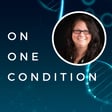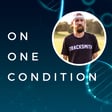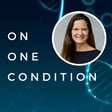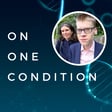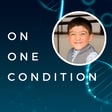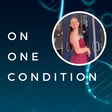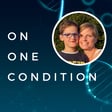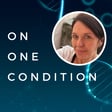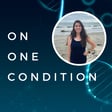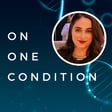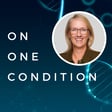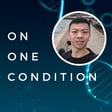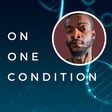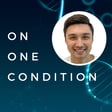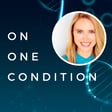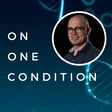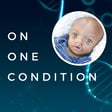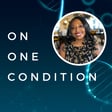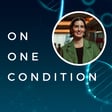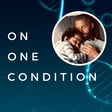Introduction of 'On One Condition' Podcast
00:00:00
Speaker
Hi, I'm Sylvain Bertelot, and you're listening to On One Condition, a podcast to raise awareness about health conditions by listening to people who leave them every day.
Introducing Guests: Christina Morgan and Sana Ansari
00:00:10
Speaker
Today, I've got the pleasure of having not one, but two guests, which is a first for the podcast, k Christina Morgan and Sana Ansari, and we're going to talk about type 1
00:00:25
Speaker
Hi both. How are you doing? Thank you for for joining me. Hello. We're excited to be here. Thanks for having us, Sylvain. Hi.
00:00:36
Speaker
Very much looking forward to this. Me too. I was very surprised, i think that's the right word, when think Christina mentioned that you have a colleague, Sana, who also has type 1 diabetes, but you both have completely different experiences in a way. So I think it's going to be very interesting for our audience to hear from both of you.
00:01:02
Speaker
I'll start with just to set the scene.
Meeting at WCG IRB During COVID
00:01:06
Speaker
How did you two meet? We met at work. So i started at WCG. We work for WCG IRB.
00:01:17
Speaker
I started here on the first day of COVID. So it was March 16th, 2020. And within a couple of weeks, I had met Sanaa.
00:01:30
Speaker
And we were working very closely together on a lot of different things. ah What, and Sana, it was probably within that first year that you had your diagnosis.
00:01:43
Speaker
Yeah, it was right within, I would say, like 16 months, because it was in August of 2021. You know, you were still 40. Barely new to the company, but it was, you know, I'd known, you know, Christina for for that 15 month time span where we've worked together.
00:01:59
Speaker
and don't know that we knew each other on a personal level at that point, but I think once I was diagnosed, that was just a, that's something that naturally happened at that point. Yeah. Yeah.
00:02:10
Speaker
Do you think that makes your relationship different in a way, both having type one diabetes? Yes. And I say yes, for the the, for the best, right? She understands things that most people don't.
00:02:26
Speaker
hu And so we can relate with one another from that perspective. Okay. I agree completely. Nice. It's good to have someone you can and talk to, i guess, and especially in the work environment, because i can imagine that there are good days and bad days.
00:02:44
Speaker
So you mentioned diagnosis, and i think that's a good point to start because you've had completely different experiences in that respect.
Christina's Early Diagnosis of Type 1 Diabetes
00:02:54
Speaker
So, Christina, would you like to take us through how you were diagnosed?
00:02:59
Speaker
Yeah. Sure. so i was diagnosed May 7th of 1996. I had just turned seven years old.
00:03:10
Speaker
I think sometimes I say i i was six years old because I think i I was still feeling very six years old. I was still in first grade at the time. i had been playing...
00:03:22
Speaker
It was my first season of machine pitch softball and i was loving it on my team. and I um i like very vivid memories of feeling like I couldn't run at one practice one day because I was so tired.
00:03:41
Speaker
I was so thirsty. i had to go to the bathroom a lot. There were, there were a lot of symptoms leading into this. That progressed into me just really feeling like I i can't move.
00:03:57
Speaker
My parents took me to the doctor, to the pediatrician, and within moments of arriving, they they checked my blood sugar and they said, we don't have time to wait here. You need to go to the emergency room right now.
00:04:13
Speaker
You have type 1 diabetes. Yeah. And I'm getting emotional about about it because I i remember the my mom's face just like like her whole life had changed.
00:04:27
Speaker
So I spent a week in the hospital at that time. So in 1996, right, it was kind of typical for newly diagnosed patients to spend one to two weeks in the hospital following that diagnosis to get the medications aligned, to get...
00:04:45
Speaker
your nutrition aligned and checked in Because at that time, there were only two forms of insulin. um i was on what's called Humulin N and Humulin are insulin. um Those are both long acting insulins.
00:05:04
Speaker
And you had to time your insulin dosing and your food intake so that your blood sugar stayed as stable as possible throughout the day. it was kind of was very tricky to learn.
00:05:19
Speaker
And so learning that and being able to hone that in within a week, I thought was really great. I thought that was a good accomplishment. But I think, right, like following that, i have a twin sister and my family's entire life changed.
00:05:35
Speaker
In hindsight, now that we're in our sister, my sister admits that she was very jealous of the attention that I got when I was a child because because of this.
00:05:48
Speaker
And right. So we, we process things as a family, thankfully, but having that diagnosis as a young child really impacted me deeply so much so that I got into research as a professional later in life.
00:06:05
Speaker
And it has impacted my sister too. and my, my, the rest of my family. One thing I will note, and I think I told Sana, I told you this when you were diagnosed is i am thankful that I grew up knowing like this is my life.
00:06:23
Speaker
I grew to accept that very early. and so I didn't like form a ton of habits as an adult prior to having that that life change.
00:06:36
Speaker
yeah And so I think I'm i'm thankful for that. Yeah, it's interesting. that's I like that you raised that point because that's something weve talked a lot about on the podcast, actually, that having ah an early diagnosis, you don't know anything different. So in a way, it becomes the norm for you as as opposed to comparing to what you used to have or what you could eat and you can't eat anymore.
Sana's Late Diagnosis of Type 1 Diabetes
00:07:00
Speaker
How about you, Sana, then? So as Christina said, you've been diagnosed quite recently. So what was your experience? Yeah, no, thank you.
00:07:12
Speaker
You know, and i have to start by saying I i genuinely admire k Christina for a being vocal about this because it allows people like me that were diagnosed later in life to have someone to go to, to ask for guidance. And Christina definitely did that for me when I was first diagnosed.
00:07:30
Speaker
And I'm going to try not to cry myself now, but unlike Christina, I was diagnosed about four years ago, our coming up on four years. It was August of 2021. I was late 30s. I was 38 when I was diagnosed.
00:07:44
Speaker
You know, as I was hearing Christina, the the symptoms are definitely similar, whether you're diagnosed as a kid or as an adult. So I was on a weekend beach trip to Virginia Beach and I was out in the sun all day. And then that evening I was just so lethargic and I just chalked it up to, you know, I was out in the sun, but I started seeing, you know,
00:08:07
Speaker
blurry vision, which the blurry vision was happening for a few weeks before that. But again, I was like, getting close to 40. This is just age, it's going to happen. Didn't think anything of it. As far as the blurred vision, I was like, I just need to go to the eye doctor.
00:08:20
Speaker
But that weekend, I mean, i just, I couldn't get up. Like it was that evening, you know, we came out of the sun, I took a nap, I do not take naps, I have to be like,
00:08:31
Speaker
deathly ill to take a nap in the afternoon. And I slept for two hours, which is not like me. The next morning I woke up and I just felt again, that lethargic feeling. I just was like, I cannot move, but I still kept trying. And I was like, you know, we went and sat out on the beach and I was so thirsty.
00:08:50
Speaker
And I'm also somebody that doesn't take in a lot of fluids during the day, but I was downing Gatorade, large bottles of it just constantly, and then running to the bathroom every five minutes. I'm like, I don't know what is happening to me.
00:09:03
Speaker
You know, so we decided to get in the car, drive home. It was about a three and a half hour drive home that ended up being closer to five hours because we had to stop every five minutes because I had to go to the bathroom and I needed something to drink.
00:09:15
Speaker
I just didn't know what was happening to me. So I get home and the next day i go to go to the doctor. And again, this is still peak COVID, right? So in my mind, I'm like, for whatever reason, because I was so lethargic. I'm like, maybe it's COVID. I don't know.
00:09:29
Speaker
Go to the doctor. They run a lot of tests. And then finally the nurse comes in She's like, we're just going to check your glucose levels really quick. And I was like, okay, you know, and she checked and within minutes the doctor came in and she was like, you're diabetic.
00:09:46
Speaker
You know, as Christina said, like that reaction that her mom had that was so emotional and just kind life-changing. Yeah. as an adult at 38, that is exactly the reaction I had.
00:09:59
Speaker
Because to me, to Christina's point, I had lived my life a certain way up until this time. I didn't form these habits that I now all of a sudden, like this was all the stuff going through my head is my entire life is changing.
00:10:15
Speaker
My first thought was about my daughter, because I was like, it's just me and her in my home. If something happens to me, she's going to have to figure out how to kind of help.
00:10:28
Speaker
So it was ah it was a tough diagnosis for me at that time because it was it was the last thing on on my mind. And then after the doctor told me, I was like, of course, that makes sense. The blurred vision, the thirst, the you know all of it. just I was like, well, yeah, obviously. like I don't know why I didn't come to that conclusion myself.
00:10:47
Speaker
But I struggled. I struggled for a long time. i felt... immediately just kind of depressed and went into a bit of a a state of depression for a while because it was that life-changing for me.
00:11:01
Speaker
And it was that very next week, I took a couple of days off work because my blood sugar was just hovering at 500, 600 because they hadn't put me on insulin yet. So I was struggling to ah figure out how to manage this.
00:11:14
Speaker
And then when I came back to work, that's when I called k Christina. And I was like, listen, I just got diagnosed. I have no idea what I'm doing and I need help.
00:11:26
Speaker
So I've got two questions. The first one, ah might be very ignorant here, but I thought type one diabetes was something that you were diagnosed with young and that couldn't happen later in life. So do you know how you've been diagnosed so late?
Understanding and Treating Type 1 Diabetes
00:11:47
Speaker
Yeah. So according to my doctor, for for for my path was more an autoimmune issue. So basically when it happened with me, my doctor was like, your organs are literally shutting down on you, including your pancreas or starting with your pancreas. It just one day just decided I'm going to stop working.
00:12:04
Speaker
Okay. So that makes sense. And do you know if anything ignited that or is it just the... there like do Honestly, we have no idea. No. That's for the doc. Because I asked, i was like, what call? She was like, it could be a number. we have no idea to be very honest.
00:12:22
Speaker
Yeah. There was, when I was diagnosed, I had had a series of ear infections, right? And with Sana communicating that They're right. This was peak COVID.
00:12:36
Speaker
It could have been COVID. it could have been any number of things that are environmental that tell your body, hey the beta cells in your pancreas are bad.
00:12:48
Speaker
of You need to attack them. Yeah. Okay. And you mentioned that you didn't know like you contacted Christina because you didn't know what to do, how to control your blood sugar.
00:13:02
Speaker
Whereas k Christina, you mentioned that you had a week at the hospital where they explained everything to you. So was this not something that was offered to you, Sana, then?
00:13:14
Speaker
You know, at the time, I think they were trying really hard because right off the bat, they weren't sure it was type one because I was diagnosed as an adult. So they were still trying to figure out if, yeah you know, a pill form of medication might be the best way to go versus insulin. So there was a period in time where they tried that, you know, they were trying to call it like the honeymoon period, if it was going to help and whatnot.
00:13:39
Speaker
that's kind of what they were trying to do at first, but they learned very quickly that the the pill form of this is not going to help me. And it just wasn't controlling anything. So it was a while before we they put me on the insulin.
00:13:51
Speaker
And then it was, you know, to k Christina's point, trying to understand how much insulin to take versus your food intake. And, you know, so there's a lot to manage there. So I right off the bat was given a long lasting insulin, but then also a short acting one. So then trying to manage both of those and and with your food intake so it was a little while.
00:14:10
Speaker
So I did lean on k Christina a lot to figure out the best way to go about doing that and what helped her. And for me, I think the biggest challenge was the coping because I felt like my life had completely changed from what I had known for 38 years.
Managing Blood Sugar Levels
00:14:28
Speaker
And we'll, we'll come to that. I think, um, So how hard is it to actually manage to have a healthy blood sugar level?
00:14:41
Speaker
I feel like that's a really loaded question, right? And it's loaded for a lot of reasons. And Sana, please like hop in here if I'm missing something.
00:14:52
Speaker
Medicine has come a a very long way in the past 30 years. So thank goodness for that. I'm taking insulin that is highly innovative, that helps me manage my blood sugar very well.
00:15:07
Speaker
And what Sana can attest to that what happened last week yeah is that we can dose ourselves appropriately and we can do everything right. And then ah viral infection hits us and no holds bar. There are...
00:15:28
Speaker
your blood sugar goes through the roof no matter what you do. And there are things that you can't control that impact your blood sugar. When you drink black coffee, there's no carbohydrates in black coffee, but it's got caffeine in it and that impacts your hormones.
00:15:47
Speaker
So that fluctuates your blood sugar. Okay. There are a lot of factors from a hormonal balancing perspective. that changed the way your body is processing things, despite all of the technological and medical advances that we've had.
00:16:05
Speaker
Yeah, I agree with k Christina there. And I think the one thing I will say is it's, it's always top of mind. There's never a moment, at least for me throughout the day where it's not something I'm thinking about. It's just a constant, depending on what I'm about to eat or drink or do, I have to figure out how that's going to impact my blood sugar.
00:16:28
Speaker
And to Christina's point, there's some times where you just, things happen like an infection or whatever, you know, last week I couldn't control, like it was a whole weekend where it was just hovering between four and 500.
00:16:39
Speaker
No matter what I did, was taking insulin. Didn't eat like black coffee. Didn't have, you know, and it just, I could not control it no matter what. And those are the days where you're just completely lethargic.
00:16:52
Speaker
But again, it's, It's always top of mind, at least for me. In the background, there's always Sana and I are talking on the phone and there are times I've wondered when we're on our phone conversations, like what calculations are happening in the back your head right now?
00:17:09
Speaker
so So what are those calculations then? Is it when do I need to eat something or ah do you keep track of the time since your last insulin intake?
00:17:23
Speaker
All of those things. yeah How am I feeling? Do I, I feel i noticed some increased thirst. Do I need to look at my meter to see if my blood sugar is elevated?
00:17:35
Speaker
Should I take some insulin? Because i had a snack a little bit ago and I feel blood sugar is going up. When's the next time i should go for a walk just to naturally try to control my blood sugar?
00:17:53
Speaker
And stress, right? Stress is a big thing. Wow. How is it compatible with with work? How do you make it work with with being sat down for a lot of time throughout the day?
Diabetes in the Workplace
00:18:09
Speaker
I mean, I think to start with, sorry, k Christina, I will say it it definitely helps to have Christina there. And the fact that we're on the same team, I think really makes a difference because I think I always know that if no one else understands, which I will say everybody is always very understanding and and supportive on our team, but I always know k Christina will understand. There have been times where we're on calls together and I'll either send a text or a chat saying, blood sugar low, be right back.
00:18:39
Speaker
And, you know, it happens and it's just, everyone understands it's just a part of our life and it's what we do. And, you know, you you may have to run for five minutes off a call to go eat something or if it's too high, take some insulin.
00:18:53
Speaker
So again, even with work, I think it's, you know, again, it's, it's always there. Right. And, you know, I think with Christina and I, especially with work trips and things like that, a lot of times if we have meetings where we go together, i think it's always for me, I feel comfort knowing that Christina's there because a she can likely, if something happens to me and I'd pass out or whatever. It hasn't happened. But if it does, you know, she she would be able to look at me honestly and say, hey, I can tell what's happening here. Yeah.
00:19:23
Speaker
You know, and so I always feel comfort in that from a work perspective. But, you know, again, that the the stress can affect your blood sugar. So that is a that is a factor that may come into play here and there.
00:19:36
Speaker
Yeah. And I would, the only thing I would add is, right, Sana said it beautifully that we we work with colleagues, thankfully, that can appreciate the advancements in medical research and technology. And so they're very understanding.
00:19:55
Speaker
Now, sometimes when we are on calls with sponsors or CROs, for example, they may not know us on a personal level like our colleagues do. And so it may be, I have had one of these instances happen where I am on the call. I'm the only person from WCG on the call.
00:20:16
Speaker
And I'm just, I've got sweats happening out of nowhere. I suddenly feel like I can't see anything and words aren't even coming out of my mouth because it happened so fast.
00:20:30
Speaker
And so that was a little embarrassing, but thankfully the sponsor that was on the call understood that I had to just leave and we were able to reconvene and I was able to catch them up afterwards once I got something to eat.
00:20:49
Speaker
Yeah, that was embarrassing. Well, yeah, but I feel like we're living in an era where you can be open about those things. you don't Hopefully, you don't feel like you have to hide. And actually, people are relatively understanding.
00:21:07
Speaker
you agree with that? i agree. I think it was right when I was just saying i was trying to come out and say it. Yeah. And i might the words weren't even happening at that point because everything had happened so quickly. i just needed food. And that was the only thing I could do, really.
Challenges Despite Medical Advancements
00:21:29
Speaker
But yes, I do think we're getting to that. i mean Right? It adds, I think it adds value when you have relationships with people that share something so personal about you.
00:21:45
Speaker
Yeah, yeah, I agree. So do you always have food next to you then? I try to. try to also, yeah. ah Sometimes, and usually it's the time you don't when you need it honestly yeah I was just going to say, it's always that one time where you're like, I thought I had that granola bar with me, but I don't. And yeah, sometimes.
00:22:08
Speaker
And I'm about to fall over. And as Christina described it, it was, I mean, as she was saying those words, I was like, I have felt those, that feeling of where the sweat just overtakes you, your body. Like it's, I mean, you just feel like you're going to pass out and words just, you you can't even formulate them. And you feel like you're just going to hit the ground if you don't get something immediately.
00:22:32
Speaker
And it really is immediate. And I think that's part of me when I was diagnosed, that was my kind of fear in the back of my head. And I guess it still is because it really is a, it can be an emergent situation at any given moment.
00:22:47
Speaker
And I think there's some fear for me that comes with that. Yeah. I can imagine being very concerned, being my, myself, if, if something like this is going to happen, is that something that you think about?
00:23:03
Speaker
I think about it all the time. Yeah. Yeah. Wow. Christina, you said that treatment has evolved a lot over the past 30 years, but still it's so impactful.
00:23:22
Speaker
And I think that's something you don't hear so much about. because of the positive comments we hear about treatment being much better and like blood sugar monitoring being much better as well.
00:23:37
Speaker
I didn't realize that you could still have episodes like this that are quite frightening. Absolutely. Yeah. it's And right, i don't I think we're continuing to get closer. There are trials...
00:23:52
Speaker
ongoing right now, they will revolutionize type one diabetes treatment. And honestly, it may cure type one diabetes. And so treatment won't maybe exist anymore, which is exciting to think through and to to think that we can be a part of that.
00:24:12
Speaker
But as far as we've come, right, there are the human body is an incredible thing It does a lot. And our hormones are a big part of the way our bodies work.
00:24:27
Speaker
And right, we're talking about a disease that is really dependent on hormonal fluctuation, no matter how you look at it, what are your testosterone levels?
00:24:38
Speaker
You know, that those are things to consider as well. what are your cortisol levels look like? How how high is your stress? All of those hormonal fluctuations impact your blood sugar. Yeah.
00:24:51
Speaker
And does your cycle monthly cycle also impact it? Yes. Yeah. Okay. so So then that's something else to to keep in mind. For those of us who are women, yes. Yeah.
00:25:06
Speaker
Wow. Oh, so I'd like to move to food now, if you don't mind.
Diabetes and Relationship with Food
00:25:13
Speaker
Because like we've talked about treatment, but the the big part of managing your blood sugar levels is also your food intake. So has it impacted your relationship with food at all?
00:25:30
Speaker
I'm curious to hear Sana's take on this. It absolutely has. And I think for me, i think the biggest term I can come up with as far as my relationship with food is guilt.
00:25:45
Speaker
um I may not be able to express that as well as I'd like, but it's again, because for me, it was a 38 years of living my life a certain way. And so to have to adjust that all of a sudden and, and look at the amount of carbs and everything and sugar and everything and, you know, caffeine or a number of things, you know, so for me, it is really, and sometimes I just feel like I just want to have the cupcake.
00:26:09
Speaker
But yeah I can't, you know, and then if I do, or if I have half of it, and my blood sugar goes slightly up, then I feel guilty because I'm like, well, I did this to myself. It's self-deprecating feeling constantly for me, at least that's the cycle in my head. I just feel like I eat something because I'm like, oh, well, you know, I've been good today. i can have this one slice of pizza or whatever it might be. And then I immediately feel guilty after it.
00:26:36
Speaker
And so That's been my relationship with food since I've been diagnosed. It's just been the cycle of guilt. yeah I wouldn't say it's guilt anymore, but as I told Savan, like early, well, it was probably about COVID time when I started reconciling my relationship with food.
00:27:00
Speaker
growing up as a female, we have a lot of pressure. have, have a lot of pressure on them nowadays. We had a lot of pressure on us when we were young and you grow up in this atmosphere of expecting to look a certain way because Barbie looks that way. Right. and you're also struggling with a disease that revolves around medicine and food, medicine and food and control of both of those things in and out of the body.
00:27:32
Speaker
and so I was probably in my master's program. It was after undergrad when I had like moved into I'm going to go into research for my career.
00:27:46
Speaker
but was studying health policy. i was studying the human body. Right. I'm in gross anatomy classes. and cadaver classes. and And making all of these decisions based on what I'm learning, but I was subsequently also self-sabotaging with food.
00:28:04
Speaker
So I would overdose on insulin so that I could have a treat, Sana, so that I could eat the Oreos with a cupcake.
00:28:15
Speaker
So it was like I was almost, it was disordered eating, right um but using medicine as a crutch to enable that. I can only imagine, you know, as a young adult going through that, right? With all the pressures and the, you know, everything that I'm, I'm experiencing that just for self-pleasure, right? It's not even a, because this is society or or the Barbie or whatever. For me, it's, I'm still struggling with that where it's like, I'm over medicating myself to have the the cupcake or the pizza. But then again,
00:28:49
Speaker
the guilt immediately. falls Yeah. And I guess there are repercussions from overdosing. There can be. Yeah. I think for pizza, what's, what's unique about pizza and that what any other type one on the planet would understand is that pizza has what's called this long-term carbohydrate dosing effect.
00:29:13
Speaker
So no matter what kind of short acting insulin you're using, you're going to have to take multiple doses over the course of, i would say, three to four hours to ensure that you're level. Yeah.
00:29:29
Speaker
Oh, yeah. So you can't eat a slice of pizza at 9 p.m. and then go to bed an hour later. No. no Your phone's going to start beeping at you. Yeah, yeah, yeah. Which is a good thing, imagine.
00:29:44
Speaker
Yeah. So it's interesting that you mentioned guilt. I have gout, which is also something to do with food. And recently I've noticed that some foods or beverages that are not necessarily good for me don't taste as good anymore because there is this guilt.
00:30:09
Speaker
There's this thing behind my... my head thinking, well, yes, you're having that, but really you shouldn't. so So it's not as good as as it should be.
00:30:21
Speaker
Do you have that feeling as well? I almost wish that was the case for me. I would be better about it. But unfortunately, I have not gotten to that point yet.
00:30:32
Speaker
Christina, I don't know if you have a different take on it. I don't. You know, it's weird. it's It's kind of hard to think through. I probably have had that happen over the course of my life. But, you know, in the past five years since I met Sana, I have also had a baby and a lot in my body hormonally has shifted and changed.
00:30:56
Speaker
So has my appetite as a result of that. And so i kind of just chalk it up to that, but maybe I shouldn't. Yeah. um
00:31:09
Speaker
So I'd like to go back to something, and and and we've kind of talked about that a bit, but ah Christina, when we when we were talking about the this recording, you said that your life is prescribed as a person with type one.
Living with a Prescribed Routine
00:31:30
Speaker
Could you explain what you mean by that? Yes. Thank you for reminding me about that. I kind of forgot. You know, it's interesting. So I, for all the CrossFitters out there that may or may not be listening, I also CrossFit is also something that I do.
00:31:48
Speaker
Entering into a competitive CrossFit atmosphere in 2020 also helped reconcile a lot of that food guilt and the unhealthy prior appetite and relationship that I had with food.
00:32:03
Speaker
Living life prescribed I mean that in a lot of different ways, right? So from a CrossFit perspective, there there's something called an RX workout. It's a prescribed workout. This is the way you're prescribed to do the workout.
00:32:20
Speaker
If you need to scale as an athlete because you're not capable of doing the movements in that order or in that way, they can create a scaled pathway for those athletes as well.
00:32:33
Speaker
What's interesting, kind of the the mentality of that, I really kind of started to dissect as a part of my life because I feel like I have always been an all or nothing person.
00:32:47
Speaker
And so it's either RX or I'm not going to do it at all. And I think The reason I've been that way living life fully prescribed is because I've always lived with a disease that requires so much control.
00:33:03
Speaker
yeah If I want my organs to be healthy, when I get to my sixties and seventies, if I want to live a full life, right? If I don't want to have eyesight issues, if I have fully functioning kidneys, if I want to have a liver that works I have to make sure that my blood sugar is in control.
00:33:28
Speaker
If I don't want neuropathy in my toes and in my fingers and in my extremities, I have to make sure my blood sugar is in control. you know, I was seven years old when doctors started telling me that.
00:33:43
Speaker
And so that's the message that I've been given my entire life of like, right, you go to a birthday party as a seven-year-old that's newly diagnosed diagnosed with type 1 diabetes, and I couldn't have birthday cake because I was living life prescribed.
00:34:01
Speaker
I was eating at certain times. I was taking insulin at certain times. And I would say now – really like day after day, things always happen.
00:34:13
Speaker
But we're still kind of learning to pivot to live life prescribed to make sure that our blood sugar is in control at all times.
00:34:25
Speaker
And it right if would if we divert, if we have to pivot the strategy, we do. but I think that's where I was coming from. Yeah, yeah. now I get it. It must be hard, you know, growing up with with such control over what you can do, what you can eat, when you need to take medicines and so on.
00:34:48
Speaker
Is that something you relate to, Sana? I think at this point, yeah, I do i think Christina has a ah better grasp on it than I do, you know, and I think that's why i may still feel a lot of the guilt versus...
00:35:02
Speaker
looking to the future to see, you know, kind of some of the things Christina mentioned and how it will impact me in the future. Right. I, I think about it, but I don't put that as important as I, as I should. I feel like I don't put the importance on it like I should.
00:35:17
Speaker
So I feel like Christina does a much better job with that piece. But overall, I think living life prescribed, I think still describes perfect way to describe Yeah.
Empathy in Clinical Research
00:35:30
Speaker
And do you feel different about working in the clinical industry? I think there's a deeper connection, right? there's ah There's a more meaningful, you know, purpose to what we do every day. You know, whether that's for for type one studies or or other studies, it's just once you you're diagnosed with but something like this, I think it becomes a lot more personal.
00:35:54
Speaker
Yeah. yeah you you take a lot more pride in the work that you do. And and not to say that I didn't before it was I was diagnosed, but, you know, I would see type one studies come through and I'd be like, all right, it's just another study that we're working on. And now there's an extra, I stopped for a second and I looked through the things and, you know, so there's there's definitely been been a shift.
00:36:15
Speaker
And then that shifts to other illnesses as well, because we're living with type one and that's what we're talking about today. But there's folks living with all kinds of stuff. And, you know, within this industry, that's, something we're trying to help.
00:36:26
Speaker
And so I think there's definitely a ah deeper impact. Yeah. you agree, Christina? Well, that that's that's how you got your vocation. So, yeah.
00:36:37
Speaker
ah hey I agree with you. i think you you can empathize much better, actually, if you have had even not necessarily similar experience, but if you've if you've had to deal with healthcare situations.
00:36:55
Speaker
Well, it's amazing how you have you've had different start to your journey, but it seems like you like there's a lot of similarities as well.
00:37:10
Speaker
And something that keeps bugging me in a way is that no matter... how much support you have around you or the advancement in treatments.
00:37:22
Speaker
There's still this learning curve that is so personal that nobody can help you with almost.
Conclusion and Reflections
00:37:31
Speaker
And it bugs me because that's something that I thought I could address through a podcast.
00:37:36
Speaker
more Yeah. Yeah. So i always ask the same question to to finish, and I'm interested to see what different what kind of different answers I'm going to get from you.
00:37:49
Speaker
So we'll start by Christina, if you don't mind. What's your happy place, a place where you feel at peace? Oh, I love that question. i love that. I was not prepared for this, but um um immediately you weren't even done with the question. And I was like, the ocean.
00:38:07
Speaker
Right. I live at the beach. I grew up at the beach. My dad's a fisherman and the ocean. I'm a surfer. The ocean is where I find peace.
00:38:20
Speaker
And it's usually like by myself is the most peaceful just by myself in the ocean. There can be other people around, but that's my happy place.
00:38:31
Speaker
can relate to that. i'm I'm a surfer as well. And being on that board is, ah yeah, it's something else. How about you, Sana?
00:38:42
Speaker
I think for me, it's a much different answer. But for me, it's anywhere i am with my daughter. i think that is 100% my happy place at all times when she's with me, whether that's here or anywhere.
00:38:56
Speaker
That's always been the case for me and and more so as she's growing up. Oh, That's beautiful. Now I kind of feel like I should have reverted and my kid too.
00:39:10
Speaker
Do you want to do a take two?
00:39:15
Speaker
hey Well, thanks a lot. ah You know, it's sort of a first, as I said, doing two two two different experiences at a time, but it's so interesting.
00:39:27
Speaker
And what I like is that I'm sure we'll have people whose children have just been diagnosed and and they'll find these very insightful, but also people who will be diagnosed later on and who will love hearing from someone with the same experience. So thank you both for your time. I really appreciate it.
00:39:50
Speaker
Thank you for the opportunity. ah Thank you so much.

